Wisdom Tooth Extraction
Professional care for wisdom tooth extraction.
Help prevent misalignment, overcrowding and other dental issues at our Jackson Square Mall dentist office.
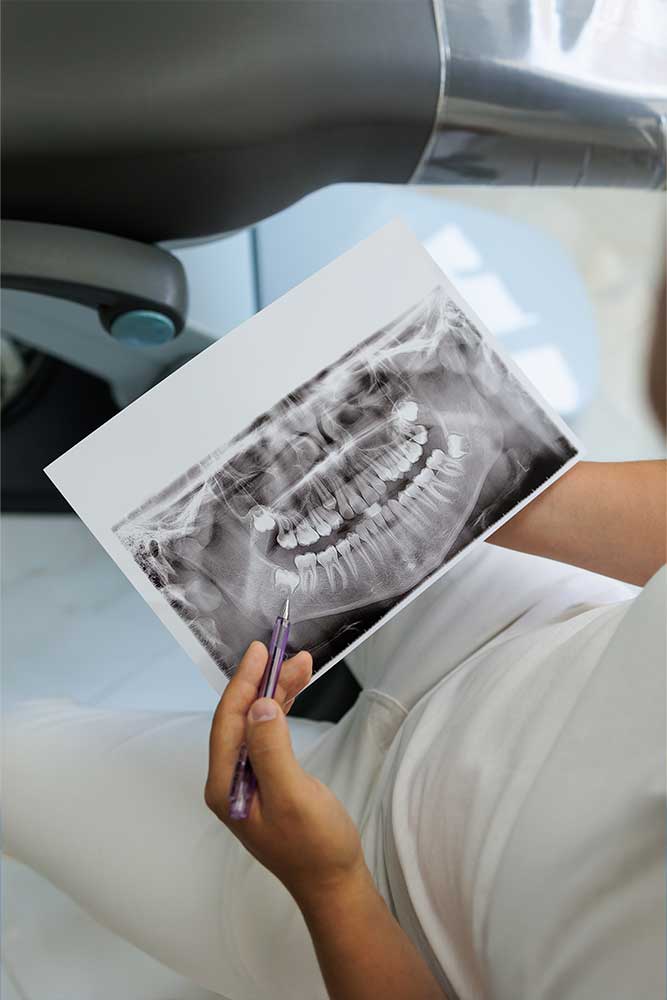
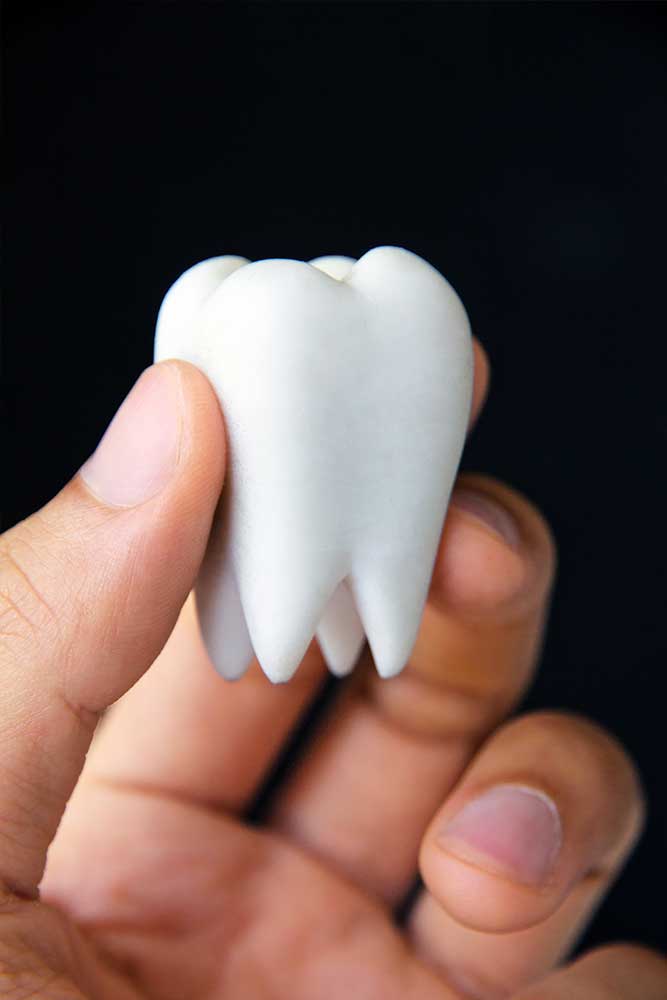
Expert help.
Healthy smile.
Overview
Wisdom tooth extraction is a common dental procedure that often marks a rite of passage for young adults. These third molars usually emerge in the late teens or early twenties, at a time known as the “age of wisdom,” hence their name. However, modern human jaws are often too small to accommodate these additional teeth, leading to a range of potential oral health issues.
Why do we extract wisdom teeth?
The reasons for extraction include impaction, where the teeth do not fully emerge, misalignment, which can crowd or damage adjacent teeth, and the risk of oral disease, such as decay and gum disease, in these hard-to-reach areas. Additionally, wisdom teeth can contribute to cyst formation and discomfort.
Benefits of having your wisdom teeth extracted
If the wisdom teeth do not fully erupt, removing them can prevent complications like misalignment, crowding, gum infections, and cyst formation. This improves oral health and mitigates the risk of painful outcomes. The benefits of extraction extend beyond preventing immediate discomfort, offering long-term advantages like:
- easier oral hygiene
- alleviation of crowding
- helping stop misalignment
- reduced risk of inflammation and infection.
For many, extracting is a proactive step towards maintaining dental well-being and overall health.
What are wisdom teeth?
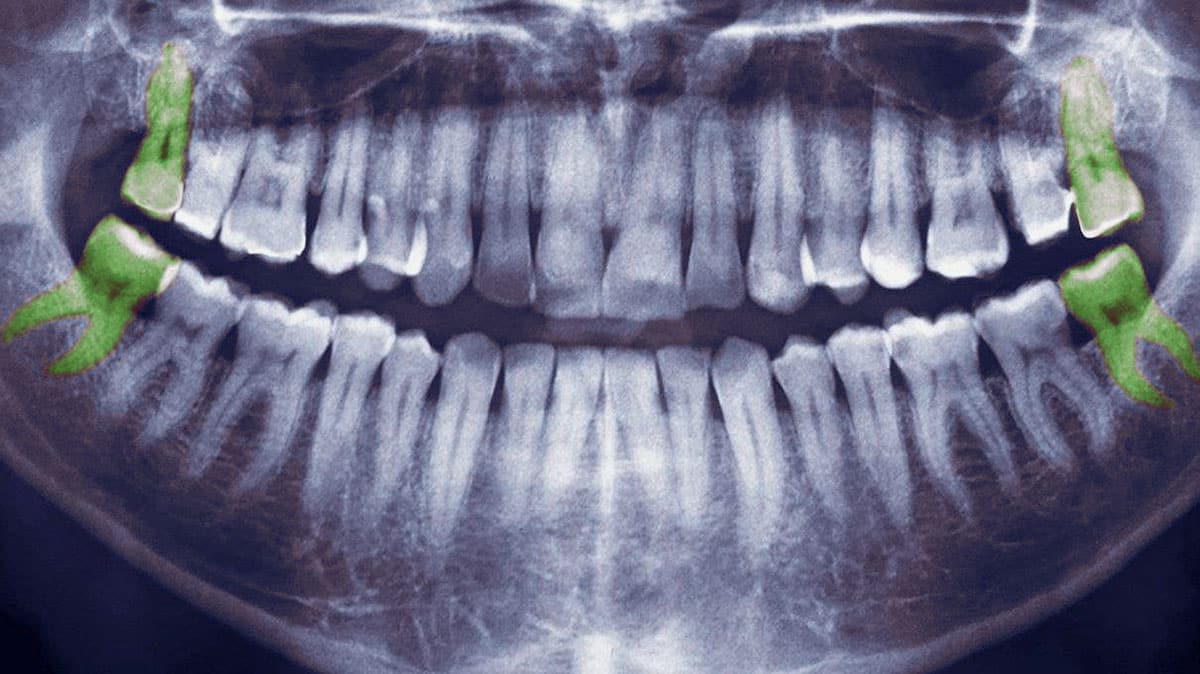
Wisdom teeth, known as third molars, are the last to develop and emerge in your mouth. Typically, there are four wisdom teeth, one in each corner of the mouth at the back. They usually appear during the late teenage years or early adulthood, often between the ages of 17 and 25.
Originally, wisdom teeth were essential for our ancestors, who had larger jaws and ate diets that caused greater tooth wear. This additional set of molars helped them grind down tough, raw foods. However, wisdom teeth are no longer necessary for oral function, as with modern diets and advanced dental care.
Modern human jaws are often not large enough to accommodate these additional teeth, which can lead to various dental issues. Problems associated with wisdom teeth include impaction (where the teeth don’t emerge properly or are misaligned and press on adjacent teeth), infection, crowding of adjacent teeth, and pain. Given these potential complications, dentists often recommend extracting wisdom teeth to prevent or address these issues and make it easier for patients to maintain their oral health.
Impacted & misaligned wisdom teeth
Impacted wisdom teeth occur when there isn’t enough space in the mouth for the teeth to emerge properly. This can cause them to come in at an angle, partially emerge, or remain trapped beneath the gum and bone. Symptoms can include pain, swelling, and difficulty opening your mouth, although some people may experience no symptoms at all. If left untreated, impacted wisdom teeth can lead to various complications such as infection, damage to adjacent teeth, and cysts.
Partially erupted wisdom teeth
Partially erupted wisdom teeth refer to those that have broken through the gum line but have not fully emerged into their expected position. This partial eruption can create openings around the teeth, making them prone to bacterial infection and gum disease since they are challenging to clean effectively. Pain, inflammation, infection and cysts are common, which is why extraction is recommended in most cases.
Signs your wisdom teeth may need to be removed
It’s not always the case, but your dentist will generally recommend having your wisdom teeth removed as a precautionary measure before they can begin to affect other teeth or your gum tissue, even if you aren’t experiencing any symptoms. Removing wisdom teeth early on is typically easier than waiting until they have fully grown roots. The longer you wait to have them extracted, the more difficult they may be to remove.
However, wisdom teeth are often not addressed until they present problems and patients are experiencing symptoms such as:
Pain and discomfort: One of the most noticeable signs is pain or throbbing at the back of the mouth, which can sometimes extend towards the ear, jaw, or neck.
Swelling: Swelling of the gums in the back of your mouth or on the side of your jaw can be a sign of impacted wisdom teeth trying to break through the gum line.
Infection or gum disease: Partially erupted wisdom teeth can leave openings for bacteria to enter around the tooth, leading to infection or gum disease, which might manifest as tenderness, redness, and bleeding.
Cysts or tumours: In some cases, untreated, impacted wisdom teeth can lead to the formation of cysts or tumours, which can cause damage to the jawbone and surrounding teeth.
Crowding or damage to adjacent teeth: Emerging wisdom teeth can push against other teeth, causing misalignment or damage that can affect your bite and oral health.
Difficulty eating or opening the mouth: If you experience pain or difficulty while chewing or opening your mouth wide, your wisdom teeth could be to blame.
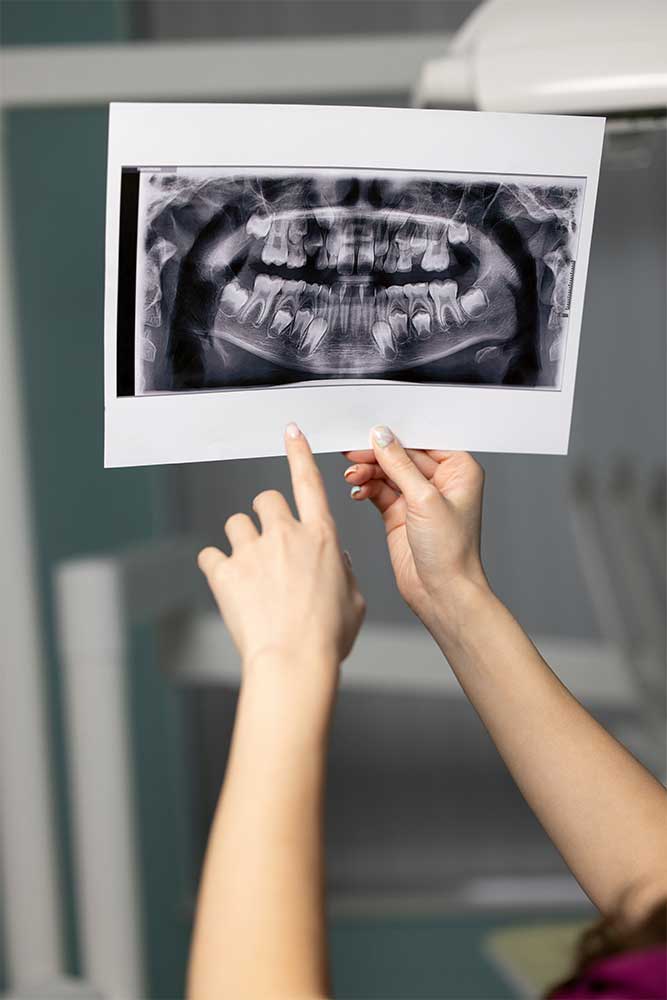
Potential complications of wisdom teeth extraction
While wisdom teeth extraction is a common and generally safe procedure, there are possible complications that patients should be aware of.
These include dry socket, an intensely painful condition where the blood clot at the extraction site fails to develop or is dislodged prematurely, exposing the underlying bone.
Infection is another risk, particularly if the extraction site is not kept clean or if bacteria become trapped.
Nerve damage, although rare, can occur, particularly with lower wisdom teeth extractions, potentially leading to numbness or a tingling sensation in the jaw, lips, or tongue.
There can also be complications related to bleeding, swelling, and difficulty opening the mouth.
While these complications are uncommon and often manageable, they underscore the importance of following post-operative care instructions and consulting with a dental professional if any unusual symptoms arise.
Risks involved in not removing wisdom teeth
The choice not to remove wisdom teeth could result the following:
- persistent pain or discomfort
- spread of infection
- gum disease
- jaw bone degradation
- damage to surrounding teeth
- cysts and benign tumours
- bad breath
- difficulty keeping the area clean
It’s important to consult with your dentist and decide whether to extract your wisdom teeth if they aren’t causing any issues.
Do wisdom teeth always need to be removed?
Wisdom teeth do not always need to be removed. The decision to extract them depends on various factors, including the individual’s dental health, the position of the wisdom teeth, and whether they are causing or likely to cause problems. If wisdom teeth are healthy, fully erupted, properly positioned, and can be cleaned as part of daily hygiene practices, they may not need to be removed.
The wisdom teeth extraction procedure

Before the extraction, your dentist or oral surgeon will conduct a thorough examination, which typically includes X-rays to determine the position of the wisdom teeth and decide the best approach for removal.
To ensure comfort during the procedure, you’ll receive a local anesthetic to numb the area around the wisdom tooth. In some cases, especially if multiple teeth are being removed or if the extraction is complex, your dentist may use sedation or general anesthesia.
For an impacted tooth, the oral surgeon may need to cut through gum and bone tissue to access the tooth. The tooth may be divided into smaller pieces to make removing it easier. Once the tooth is accessed, it will be carefully loosened and removed from the jawbone.
After removing the tooth, the extraction site is cleaned of any debris. Your surgeon may place stitches to help the gum heal (these may dissolve or require removal later).
Post-extraction, you’ll be advised to rest and follow specific aftercare instructions to facilitate healing. These typically include managing swelling with ice packs, eating soft foods, avoiding certain activities like smoking or drinking through a straw, and gently rinsing your mouth with salt water to promote healing and prevent infection.
Wisdom teeth removal at Martindale Dental

Expert & experienced oral surgeons: Our dentists and oral surgeons are experts in maxillofacial procedures and ensure the highest standards of care in even the most complex cases.

Simple & surgical extraction: Whether dealing with impacted, misaligned, or atypical wisdom teeth, our team utilizes advanced techniques and technologies to minimize discomfort and promote swift recovery.

Proven assessment & treatment planning: By choosing Martindale Dental for wisdom teeth extraction, patients benefit from a focused approach that prioritizes safety, efficacy, and optimal post-surgical outcomes, ensuring a smoother path to recovery and long-term oral health.

Advanced pain management: Our team ensures safe and effective pain management during all wisdom teeth extraction procedures. We offer local anesthesia and multiple sedation options, including nitrous oxide or intravenous sedation, to help our patients stay relaxed and pain-free.

Committed to patient comfort: Wisdom tooth extraction can be a daunting procedure which is why our team focuses on creating a supportive environment and communicating clearly. Our pain management strategies are tailored to each patient’s needs to help reduce anxiety and ensure a pain-free procedure.

Post-operative care: Our team helps patients manage swelling and pain with medication and provides detailed care instructions to minimize complications and speed up recovery time.

Emergency response: If a post-operative complication arises (excessive pain, swelling, bleeding), our office provides emergency dental appointments and care to ensure our patient’s oral health safety.
Anesthetia options and considerations for wisdom teeth removal?
Choosing the right type of anesthesia is a critical part of the treatment plan. Our dentist will explain the benefits and considerations of each option to help you make an informed decision. Here’s an overview of the available anesthesia options:
Local Anesthesia
Local anesthesia involves the injection of a numbing agent directly into the area around the wisdom tooth. This type of anesthesia is commonly used for simple extractions.
Benefits:
- Keeps you fully awake and aware during the procedure.
- Allows for a quick recovery with minimal side effects.
- You can drive yourself home after the procedure.
Considerations:
- You may feel pressure and movement during the extraction, but no pain.
- Best suited for patients who are comfortable with being awake during dental procedures.
Nitrous Oxide Sedation
Also known as “laughing gas,” nitrous oxide is a sedative gas inhaled through a mask placed over your nose. It helps you relax while remaining conscious.
Benefits:
- Provides a calming effect, reducing anxiety and discomfort.
- Quick onset and wears off rapidly after the procedure.
- You can typically return to normal activities soon after the appointment.
Considerations:
- Suitable for patients with mild to moderate anxiety.
- May not be sufficient for very anxious patients or more complex extractions.
Sedation
Sedation anesthesia ranges from mild to deep sedation, depending on the medication used and the patient’s needs. It can be administered orally (in pill form), intravenously (IV), or through inhalation.
Benefits:
- Mild Sedation: Keeps you relaxed and slightly drowsy but still awake and able to respond to instructions.
- Moderate Sedation: Puts you in a deeper state of relaxation where you may not remember much of the procedure.
- Deep Sedation: Keeps you on the edge of consciousness, barely awake but not completely unconscious.
Considerations:
- Recovery time varies based on the level of sedation.
- You will need someone to drive you home after the procedure.
- Suitable for patients with higher levels of anxiety or those undergoing multiple extractions.
General Anesthesia
General anesthesia puts you into a completely unconscious state, ensuring you feel no pain and have no memory of the procedure. This is administered intravenously by an anesthesiologist or trained professional.
Benefits:
- Ideal for complex or multiple extractions.
- Complete lack of awareness during the procedure.
- Ensures no pain or discomfort is felt.
Considerations:
- Requires a longer recovery period.
- You will need someone to accompany you home and stay with you after the procedure.
- Best for patients with severe anxiety or when multiple teeth need to be extracted in one session.
Determining the Appropriate Anesthesia
We will help you determine the most appropriate anesthesia based on several factors, including your comfort level, the extraction’s complexity, and overall health. During your consultation, we will discuss:
- Your medical history and any previous reactions to anesthesia.
- Your level of anxiety and comfort with dental procedures.
- The number of wisdom teeth being removed and their position.
- Any underlying health conditions that might affect anesthesia choices.
By carefully considering these factors, we ensure a safe and comfortable experience tailored to your needs.
Our expertise
Our experience
Our quality
Our skilled dental professionals and staff are experts in crown and bridge procedures. Our office specializes in restoring and enhancing smiles using the latest techniques and technology to ensure functional and aesthetically pleasing dental restorations.
Our team has the experience to provide personalized solutions that blend seamlessly with your natural teeth. From the first consultation to the final fitting, our team knows how to make the procedure process hassle-free and successful.
We understand the importance of function and aesthetics, which is why we use only the highest-quality materials and cutting-edge techniques. Our smile restoration work ensures every patient leaves our clinic with a stronger, more beautiful smile.
Wisdom teeth removal FAQ
The procedure itself is not painful due to anesthesia, but you may experience discomfort during recovery, which can be managed with pain medications.
The extraction of a wisdom tooth usually takes about 45 minutes to an hour, but this can vary depending on the complexity of the case.
Initial recovery typically takes about one week, but complete healing can take a few weeks. Follow-up care is important to monitor healing progress.
Most people can return to normal activities within a few days, but it’s best to rest and avoid strenuous activities for at least a week.
Stitches are often used to close the incision, and they are usually dissolvable and do not need to be removed.
Yes, but be gentle around the extraction site. Avoid brushing directly over the site for the first few days and rinse with warm salt water.
A bad taste can occur due to blood or slight infection; if it persists, consult your dentist to rule out any complications.
Numbness from local anesthesia typically lasts a few hours after the procedure. If you receive sedation or general anesthesia, it may take longer to fully regain sensation.
Yes, upper wisdom teeth can sometimes affect the sinuses, leading to congestion, pain, or pressure.
To prevent increased bleeding and swelling, it is recommended that strenuous exercise be avoided for at least a week after the procedure.
A low-grade fever can be normal, but if it persists or is high, contact your dentist as it may indicate an infection.
Properly performed extractions should not negatively affect other teeth, but untreated impacted wisdom teeth can cause damage to adjacent teeth.
Sleep with your head elevated using pillows to reduce swelling and prevent blood from pooling in the extraction site.
These are pieces of gum tissue that may be left after extraction. They typically heal on their own but can be removed if they cause discomfort.
Yes, many patients have all four wisdom teeth removed in one appointment for convenience and to minimize recovery time.
Have questions or concerns about wisdom teeth removal?
Book your free consultation at our
Jackson Square Mall location now.
Wisdom Tooth
Extraction
Professional care for wisdom tooth extraction.
Help prevent misalignment, overcrowding and other dental issues at our Jackson Square Mall dentist office.
help.
smile.


Overview
Wisdom tooth extraction is a common dental procedure that often marks a rite of passage for young adults. These third molars usually emerge in the late teens or early twenties, at a time known as the “age of wisdom,” hence their name. However, modern human jaws are often too small to accommodate these additional teeth, leading to a range of potential oral health issues.
Why do we extract wisdom teeth?
The reasons for extraction include impaction, where the teeth do not fully emerge, misalignment, which can crowd or damage adjacent teeth, and the risk of oral disease, such as decay and gum disease, in these hard-to-reach areas. Additionally, wisdom teeth can contribute to cyst formation and discomfort.
Your dentist will determine whether dental crowns are the best restoration option for your situation or if procedures such as dental veneers or dental implants would provide a better treatment outcome.
Benefits of having your wisdom teeth extracted
If the wisdom teeth do not fully erupt, removing them can prevent complications like misalignment, crowding, gum infections, and cyst formation. This improves oral health and mitigates the risk of painful outcomes. The benefits of extraction extend beyond preventing immediate discomfort, offering long-term advantages like:
- easier oral hygiene
- alleviation of crowding
- helping stop misalignment
- reduced risk of inflammation and infection.
For many, extracting is a proactive step towards maintaining dental well-being and overall health.
What are wisdom teeth?

Wisdom teeth, known as third molars, are the last to develop and emerge in your mouth. Typically, there are four wisdom teeth, one in each corner of the mouth at the back. They usually appear during the late teenage years or early adulthood, often between the ages of 17 and 25.
Originally, wisdom teeth were essential for our ancestors, who had larger jaws and ate diets that caused greater tooth wear. This additional set of molars helped them grind down tough, raw foods. However, wisdom teeth are no longer necessary for oral function, as with modern diets and advanced dental care.
Modern human jaws are often not large enough to accommodate these additional teeth, which can lead to various dental issues. Problems associated with wisdom teeth include impaction (where the teeth don’t emerge properly or are misaligned and press on adjacent teeth), infection, crowding of adjacent teeth, and pain. Given these potential complications, dentists often recommend extracting wisdom teeth to prevent or address these issues and make it easier for patients to maintain their oral health.
Impacted & misaligned wisdom teeth
Impacted wisdom teeth occur when there isn’t enough space in the mouth for the teeth to emerge properly. This can cause them to come in at an angle, partially emerge, or remain trapped beneath the gum and bone. Symptoms can include pain, swelling, and difficulty opening your mouth, although some people may experience no symptoms at all. If left untreated, impacted wisdom teeth can lead to various complications such as infection, damage to adjacent teeth, and cysts.
Partially erupted wisdom teeth
Partially erupted wisdom teeth refer to those that have broken through the gum line but have not fully emerged into their expected position. This partial eruption can create openings around the teeth, making them prone to bacterial infection and gum disease since they are challenging to clean effectively. Pain, inflammation, infection and cysts are common, which is why extraction is recommended in most cases.
Signs your wisdom teeth may need to be removed
It’s not always the case, but your dentist will generally recommend having your wisdom teeth removed as a precautionary measure before they can begin to affect other teeth or your gum tissue, even if you aren’t experiencing any symptoms. Removing wisdom teeth early on is typically easier than waiting until they have fully grown roots. The longer you wait to have them extracted, the more difficult they may be to remove.
However, wisdom teeth are often not addressed until they present problems and patients are experiencing symptoms such as:
Pain and discomfort: One of the most noticeable signs is pain or throbbing at the back of the mouth, which can sometimes extend towards the ear, jaw, or neck.
Swelling: Swelling of the gums in the back of your mouth or on the side of your jaw can be a sign of impacted wisdom teeth trying to break through the gum line.
Infection or gum disease: Partially erupted wisdom teeth can leave openings for bacteria to enter around the tooth, leading to infection or gum disease, which might manifest as tenderness, redness, and bleeding.
Cysts or tumours: In some cases, untreated, impacted wisdom teeth can lead to the formation of cysts or tumours, which can cause damage to the jawbone and surrounding teeth.
Crowding or damage to adjacent teeth: Emerging wisdom teeth can push against other teeth, causing misalignment or damage that can affect your bite and oral health.
Difficulty eating or opening the mouth: If you experience pain or difficulty while chewing or opening your mouth wide, your wisdom teeth could be to blame.
Potential complications of wisdom teeth extraction
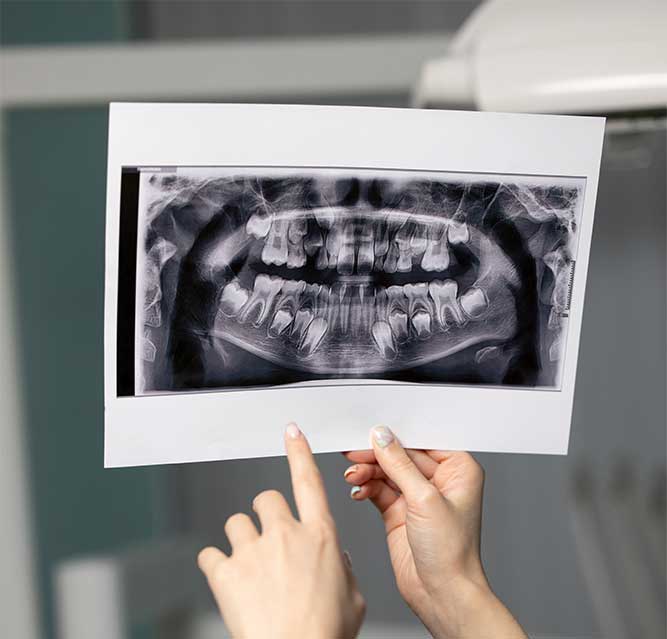
While wisdom teeth extraction is a common and generally safe procedure, there are possible complications that patients should be aware of.
These include dry socket, an intensely painful condition where the blood clot at the extraction site fails to develop or is dislodged prematurely, exposing the underlying bone.
Infection is another risk, particularly if the extraction site is not kept clean or if bacteria become trapped.
Nerve damage, although rare, can occur, particularly with lower wisdom teeth extractions, potentially leading to numbness or a tingling sensation in the jaw, lips, or tongue.
There can also be complications related to bleeding, swelling, and difficulty opening the mouth.
While these complications are uncommon and often manageable, they underscore the importance of following post-operative care instructions and consulting with a dental professional if any unusual symptoms arise.
Risks involved in not removing wisdom teeth
The choice not to remove wisdom teeth could result the following:
- persistent pain or discomfort
- spread of infection
- gum disease
- jaw bone degradation
- damage to surrounding teeth
- cysts and benign tumours
- bad breath
- difficulty keeping the area clean
It’s important to consult with your dentist and decide whether to extract your wisdom teeth if they aren’t causing any issues.
Do wisdom teeth always need to be removed?
The wisdom teeth extraction procedure
Before the extraction, your dentist or oral surgeon will conduct a thorough examination, which typically includes X-rays to determine the position of the wisdom teeth and decide the best approach for removal.
To ensure comfort during the procedure, you’ll receive a local anesthetic to numb the area around the wisdom tooth. In some cases, especially if multiple teeth are being removed or if the extraction is complex, your dentist may use sedation or general anesthesia.
For an impacted tooth, the oral surgeon may need to cut through gum and bone tissue to access the tooth. The tooth may be divided into smaller pieces to make removing it easier. Once the tooth is accessed, it will be carefully loosened and removed from the jawbone.
After removing the tooth, the extraction site is cleaned of any debris. Your surgeon may place stitches to help the gum heal (these may dissolve or require removal later).

Wisdom teeth removal at Martindale Dental

Expert & experienced oral surgeons:
Our dentists and oral surgeons are experts in maxillofacial procedures and ensure the highest standards of care in even the most complex cases.

Simple & surgical extraction:
Whether dealing with impacted, misaligned, or atypical wisdom teeth, our team utilizes advanced techniques and technologies to minimize discomfort and promote swift recovery.

Proven assessment & treatment planning:
By choosing Martindale Dental for wisdom teeth extraction, patients benefit from a focused approach that prioritizes safety, efficacy, and optimal post-surgical outcomes, ensuring a smoother path to recovery and long-term oral health.

Advanced pain management:
Our team ensures safe and effective pain management during all wisdom teeth extraction procedures. We offer local anesthesia and multiple sedation options, including nitrous oxide or intravenous sedation, to help our patients stay relaxed and pain-free

Committed to patient comfort:
Wisdom tooth extraction can be a daunting procedure which is why our team focuses on creating a supportive environment and communicating clearly. Our pain management strategies are tailored to each patient’s needs to help reduce anxiety and ensure a pain-free procedure.

Post-operative care:
Our team helps patients manage swelling and pain with medication and provides detailed care instructions to minimize complications and speed up recovery time.

Emergency response:
If a post-operative complication arises (excessive pain, swelling, bleeding), our office provides emergency dental appointments and care to ensure our patient’s oral health safety.
Anesthetia options and considerations for wisdom teeth removal?
Choosing the right type of anesthesia is a critical part of the treatment plan. Our dentist will explain the benefits and considerations of each option to help you make an informed decision. Here’s an overview of the available anesthesia options:
Local Anesthesia
Local anesthesia involves the injection of a numbing agent directly into the area around the wisdom tooth. This type of anesthesia is commonly used for simple extractions.
Benefits:
- Keeps you fully awake and aware during the procedure.
- Allows for a quick recovery with minimal side effects.
- You can drive yourself home after the procedure.
Considerations:
- You may feel pressure and movement during the extraction, but no pain.
- Best suited for patients who are comfortable with being awake during dental procedures.
Nitrous Oxide Sedation
Also known as “laughing gas,” nitrous oxide is a sedative gas inhaled through a mask placed over your nose. It helps you relax while remaining conscious.
Benefits:
- Provides a calming effect, reducing anxiety and discomfort.
- Quick onset and wears off rapidly after the procedure.
- You can typically return to normal activities soon after the appointment.
Considerations:
- Suitable for patients with mild to moderate anxiety.
- May not be sufficient for very anxious patients or more complex extractions.
Sedation
Sedation anesthesia ranges from mild to deep sedation, depending on the medication used and the patient’s needs. It can be administered orally (in pill form), intravenously (IV), or through inhalation.
Benefits:
- Mild Sedation: Keeps you relaxed and slightly drowsy but still awake and able to respond to instructions.
- Moderate Sedation: Puts you in a deeper state of relaxation where you may not remember much of the procedure.
- Deep Sedation: Keeps you on the edge of consciousness, barely awake but not completely unconscious.
Considerations:
- Recovery time varies based on the level of sedation.
- You will need someone to drive you home after the procedure.
- Suitable for patients with higher levels of anxiety or those undergoing multiple extractions.
General Anesthesia
General anesthesia puts you into a completely unconscious state, ensuring you feel no pain and have no memory of the procedure. This is administered intravenously by an anesthesiologist or trained professional.
Benefits:
- Ideal for complex or multiple extractions.
- Complete lack of awareness during the procedure.
- Ensures no pain or discomfort is felt.
Considerations:
- Requires a longer recovery period.
- You will need someone to accompany you home and stay with you after the procedure.
- Best for patients with severe anxiety or when multiple teeth need to be extracted in one session.
Determining the Appropriate Anesthesia
We will help you determine the most appropriate anesthesia based on several factors, including your comfort level, the extraction’s complexity, and overall health. During your consultation, we will discuss:
- Your medical history and any previous reactions to anesthesia.
- Your level of anxiety and comfort with dental procedures.
- The number of wisdom teeth being removed and their position.
- Any underlying health conditions that might affect anesthesia choices.
By carefully considering these factors, we ensure a safe and comfortable experience tailored to your needs.
Wisdom teeth removal FAQ
Initial recovery typically takes about one week, but complete healing can take a few weeks. Follow-up care is important to monitor healing progress.
Recovery can vary but generally takes a few days to a week for initial healing, with full recovery taking a few weeks.
You’ll need to stick to soft foods and avoid chewing near the extraction site to prevent irritation and aid healing.
Recommendations include resting, avoiding strenuous activities, keeping the head elevated, applying ice to reduce swelling, and following oral hygiene instructions.
It’s often advised to avoid strenuous activities for a week or so to aid the healing process.
Stitches may be needed, especially if an incision is made. Your surgeon will inform you if they are dissolvable or need to be removed.
No, once wisdom teeth are removed, they do not regrow.
Proper extraction should not negatively affect other teeth, though slight movement may be noticed as pressure is relieved in your mouth.
Initial recovery typically takes about one week, but complete healing can take a few weeks. Follow-up care is important to monitor healing progress.
Properly performed extractions should not negatively affect other teeth, but untreated impacted wisdom teeth can cause damage to adjacent teeth.
Have questions or concerns about wisdom teeth extraction?
Book your free consultation at our
Jackson Square Mall location now.
